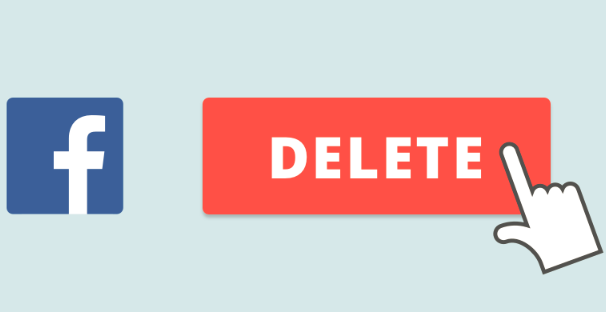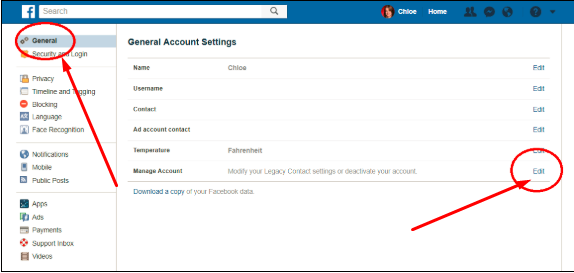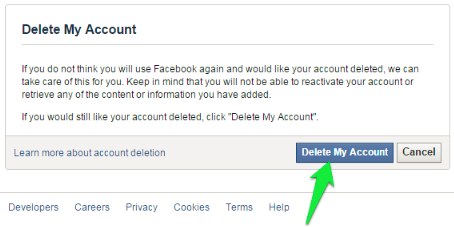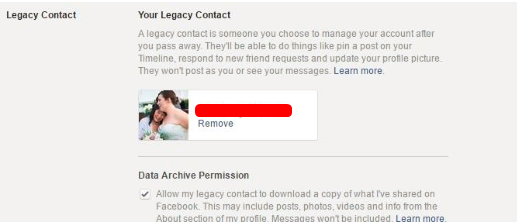How Do I Quit Facebook
By
MUFY UJASH
—
Sep 8, 2018
—
Deleting Facebook Account
Recent events could have you pondering a break from Facebook. That's not an alternative for everybody; in that instance, simply tighten up your account settings. How Do I Quit Facebook: But if having your information extracted for political functions without your consent sketches you out, there are ways to liberate yourself from the massive social media.
If you await a social networks break, here's the best ways to delete Facebook.
How Do I Quit Facebook
Deactivating
Facebook provides you 2 alternatives: 2 choices: deactivate or delete
The initial could not be less complicated. On the desktop, click the drop-down menu at the top-right of your display and select settings. Click General on the leading left, Edit beside "Manage Account" Scroll down and also you'll see a "Deactivate My Account" web link near the bottom. (Here's the direct link to make use of while visited.).
If you're on your mobile device, such as using Facebook for iOS, in a similar way go to settings > Account settings > General > Manage Account > Deactivate.
Facebook doesn't take this lightly - it'll do whatever it could to keep you about, including emotional blackmail regarding just how much your friends will miss you.
Thus, "Deactivation" is not the same as leaving Facebook. Yes, your timeline will disappear, you won't have access to the website or your account by means of mobile apps, friends can't post or contact you, and you'll shed access to all those third-party services that use (or require) Facebook for login. However Facebook does not delete the account. Why? So you could reactivate it later.
Just if expected re-activation isn't in your future, you must download a copy of all your data on Facebook - posts, photos, videos, chats, and so on-- from the settings menu (under "General"). Exactly what you locate might amaze you, as our Neil Rubenking learnt.
Account Removal
To fully erase your Facebook account forever and ever, most likely to the Remove My Account page at https://www.facebook.com/help/delete_account. Simply be aware that, per the Facebook data use policy "after you eliminate details from your account or remove your account, copies of that information could remain viewable elsewhere to the level it has been shared with others, it was otherwise dispersed pursuant to your personal privacy settings, or it was replicated or stored by various other customers.".
Translation: if you composed a talk about a good friend's status upgrade or picture, it will certainly stay after you remove your very own profile. A few of your posts and photos could hang around for as long as 90 days after deletion, as well, however just on Facebook web servers, not reside on the website.
Deletion in support of Others
If you wish to alert Facebook about a user you know is under 13, you can report the account, you narc. If Facebook can "reasonably confirm" the account is used by a person underage-- Facebook outlaws children under 13 to follow government law-- it will certainly remove the account instantly, without informing any person.
There's a separate form to request removal of make up people that are medically incapacitated as well as thus not able to use Facebook. For this to work, the requester has to show they are the guardian of the individual concerned (such as by power of attorney) in addition to deal a main note from a medical professional or medical center that define the incapacitation. Redact any type of details necessary to keep some personal privacy, such as medical account numbers, addresses, etc.
If an individual has passed away, a legacy call-- a Facebook close friend or loved one who was assigned by the account proprietor prior to they died-- could obtain access to that individual's timeline, when accepted by Facebook. The heritage call may have to give a connect to an obituary or other documents such as a fatality certificate. Facebook will certainly "hallow" the web page so the departed timeline lives on (under control of the heritage contact, who can't post as you), or if chosen, remove it.
Mark a specific tradition get in touch with person to handle your account after your passing away. You could find that under settings > General > Manage Account > Your Legacy Contact. Once you set one up, you'll obtain a notification annually from Facebook to double check that the contact should remain the same, unless you opt out of that. You could additionally take the added action of making sure that after you pass away, if the tradition contact does report you to Facebook as deceased, your account gets removed (even if the tradition contact desires the timeline to be memorialized).
If you await a social networks break, here's the best ways to delete Facebook.
How Do I Quit Facebook
Deactivating
Facebook provides you 2 alternatives: 2 choices: deactivate or delete
The initial could not be less complicated. On the desktop, click the drop-down menu at the top-right of your display and select settings. Click General on the leading left, Edit beside "Manage Account" Scroll down and also you'll see a "Deactivate My Account" web link near the bottom. (Here's the direct link to make use of while visited.).
If you're on your mobile device, such as using Facebook for iOS, in a similar way go to settings > Account settings > General > Manage Account > Deactivate.
Facebook doesn't take this lightly - it'll do whatever it could to keep you about, including emotional blackmail regarding just how much your friends will miss you.
Thus, "Deactivation" is not the same as leaving Facebook. Yes, your timeline will disappear, you won't have access to the website or your account by means of mobile apps, friends can't post or contact you, and you'll shed access to all those third-party services that use (or require) Facebook for login. However Facebook does not delete the account. Why? So you could reactivate it later.
Just if expected re-activation isn't in your future, you must download a copy of all your data on Facebook - posts, photos, videos, chats, and so on-- from the settings menu (under "General"). Exactly what you locate might amaze you, as our Neil Rubenking learnt.
Account Removal
To fully erase your Facebook account forever and ever, most likely to the Remove My Account page at https://www.facebook.com/help/delete_account. Simply be aware that, per the Facebook data use policy "after you eliminate details from your account or remove your account, copies of that information could remain viewable elsewhere to the level it has been shared with others, it was otherwise dispersed pursuant to your personal privacy settings, or it was replicated or stored by various other customers.".
Translation: if you composed a talk about a good friend's status upgrade or picture, it will certainly stay after you remove your very own profile. A few of your posts and photos could hang around for as long as 90 days after deletion, as well, however just on Facebook web servers, not reside on the website.
Deletion in support of Others
If you wish to alert Facebook about a user you know is under 13, you can report the account, you narc. If Facebook can "reasonably confirm" the account is used by a person underage-- Facebook outlaws children under 13 to follow government law-- it will certainly remove the account instantly, without informing any person.
There's a separate form to request removal of make up people that are medically incapacitated as well as thus not able to use Facebook. For this to work, the requester has to show they are the guardian of the individual concerned (such as by power of attorney) in addition to deal a main note from a medical professional or medical center that define the incapacitation. Redact any type of details necessary to keep some personal privacy, such as medical account numbers, addresses, etc.
If an individual has passed away, a legacy call-- a Facebook close friend or loved one who was assigned by the account proprietor prior to they died-- could obtain access to that individual's timeline, when accepted by Facebook. The heritage call may have to give a connect to an obituary or other documents such as a fatality certificate. Facebook will certainly "hallow" the web page so the departed timeline lives on (under control of the heritage contact, who can't post as you), or if chosen, remove it.
Mark a specific tradition get in touch with person to handle your account after your passing away. You could find that under settings > General > Manage Account > Your Legacy Contact. Once you set one up, you'll obtain a notification annually from Facebook to double check that the contact should remain the same, unless you opt out of that. You could additionally take the added action of making sure that after you pass away, if the tradition contact does report you to Facebook as deceased, your account gets removed (even if the tradition contact desires the timeline to be memorialized).




